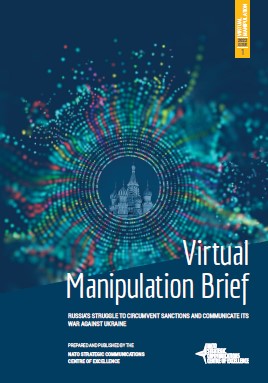Virtual Manipulation Brief: Russia's Struggle to Circumvent Sanctions and Communicate Its War Against Ukraine
Virtual Manipulation Brief: Russia's Struggle to Circumvent Sanctions and Communicate Its War Against Ukraine
Author(s): Rolf Fredheim, Martha Stolze
Subject(s): Media studies, Political behavior, Politics and communication, ICT Information and Communications Technologies, Geopolitics, Peace and Conflict Studies, Russian Aggression against Ukraine
Published by: NATO Strategic Communications Centre of Excellence
Keywords: Russian language conversation; Invasion of Ukraine; Kremlin's messaging and political aims; VKontakte; RuTube; Telegram; Twitter; Social media and politics; NATO; Russia's war against Ukraine;
Summary/Abstract: In this first issue of the Virtual Manipulation Brief, we zoom in on the Russian language conversation, and how it changed as a result of the decision to invade Ukraine. Sanctions hindered the Kremlin’s messaging on Western platforms, while the focus on domestic audiences pulled many propagandists to Telegram, VKontakte, and RuTube. The number of Russian Telegram users has increased by two-thirds, while four in five users of Facebook and Instagram have left Meta’s platforms. The increase in users understates the importance of Telegram. It acts as a reliable hub, where pro-regime voices can post (almost) without fear of platform censorship. Kremlin propagandist Margarita Simonyan’s social media posting patterns reveal how communication has adapted following Russia's invasion of Ukraine. In response to sanctions, she, together with many journalists working for RT and Sputnik, moved to posting through Telegram. Telegram posts are automatically cross-posted to her Western platforms, meaning the messaging continues to flow at little or no extra effort. This method has the added benefit of evading attempts by Twitter to prevent the amplification of RT content. Such use of automation means the Kremlin’s messaging will not disappear on Western platforms, even when domestic audiences are the primary focus. The comparison of Russian-language messaging about NATO on VKontakte and Twitter shows how this combination of push and pull factors has dramatically altered the Kremlin’s reach. We estimate that the relative reach of pro-Kremlin messaging on VKontakte in March 2022 was a hundred times more than normal, compared to Twitter. The Virtual Manipulation Brief builds on our Robotrolling reports, tracking how Russian bots and trolls manipulate the flow of information online. It expands the area of focus beyond the conversation about NATO to Russia’s war against Ukraine. And it will look beyond Twitter and VKontakte to track how antagonists use other social media platforms to disinform the public. In this issue, we start by examining how social media usage in Russia changed since February. A comparison of heavily amplified content about NATO on Twitter and VKontakte exposes the Kremlin’s waning ability to control conversations on Western platforms. Finally, we show how the Kremlin propagandist Margarita Simonyan moved her communication to Telegram to evade sanctions directed at RT.
- Page Count: 8
- Publication Year: 2022
- Language: English
- Content File-PDF

